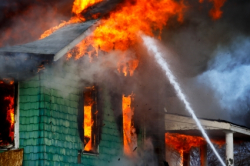Fire Preparedness
From Tualatin Valley Fire & Rescue
There are ways to prevent and survive a fire. It's not a question of luck, it's a matter of planning ahead.
Smoke Alarms & Escape Planning
Make Sure You Have Working Smoke Alarms
Smoke kills. Most fire deaths and injuries are caused by smoke, not flames. They occur at night while victims sleep. Smoke alarms won't prevent fires, but they will increase your chances of getting out and calling the fire department. Working smoke alarms more than double your chance of surviving a fire.
Make sure you have smoke alarms placed on every level of your home and each sleeping area.
Cooking fires are the leading cause of home fires.
- Never leave food unattended on the stovetop - turn off burners or set a timer if you leave the room for any reason.
- Heat cooking oil slowly and never leave unattended. Turn down the heat if it begins to smoke.
- Keep combustibles away from the stovetop and keep your cooking area clean.
- If you experience a stovetop fire and the fire is large or appears to be growing, do not attempt to extinguish. Leave the house quickly and call 9-1-1 from a cell phone or neighbor's house. However, if the fire is still in the pan or oven and has not spread to nearby counters or cabinets, you may be able to extinguish it yourself through one of the following methods.
To Extinguish a Pan or Oven Fire:
- Put a Lid on It. The easiest way to extinguish a small pan fire is with a pan lid. Turn off the burner and carefully slide a pan lid over the pan from the side. The lid will "smother" the fire. Do not move the pan until the fire is completely extinguished and the pan is cool. If you do not have a pan lid, you may also use a baking sheet or pizza pan.
- Use a fire extinguisher only if the fire is small and has not spread outside the pan. The discharge of a portable fire extinguisher lasts between 8 and 10 seconds.
- Shut the door on oven or microwave fires and turn off the heat.
*Note: NEVER transfer a burning pan from the stovetop to the sink or out the back door. The fire may grow in size, burn you or spread to countertop. Also, never pour water on a grease fire. The flames will "splash," causing the fire to spread and likely result in burns to your body.
Cigarettes/Smoking Materials Fires
Cigarettes may be small but they have the potential to cause BIG problems.
Disposing of Smoking Materials Properly
- Don’t put cigarettes out in landscaping or potted plants. Potting soil is an organic material and has the potential to ignite.
- The best option for ensuring complete extinguishment of smoking materials is to smother them with water in a metal container.
- Don't let cigarette butts pile up - the materials are combustible and may smolder for several hours before causing a fire.
- Don't toss your smoking materials out on the roadway or into landscaping.
- Don't smoke while drowsy or sleepy.
Please watch this time-lapsed video from the National Fire Protection Association on how quickly a smoldering cigarette can cause a major fire.
Safety
TVF&R strongly advocates the installation of home fire sprinkler systems. Why? Because they work. Sprinklers are proven to significantly reduce the amount of property damage from fire and provide a tenable space that allows occupants to safely exit the home.
A fire extinguisher can be an effective tool for fighting a small fire. Keep one in a location that's easy to access. If a fire continues to burn after using a fire extinguisher, exit the building immediately and call 911 from a neighbor's house.
Resources
For a printable brochure on how to use a fire extinguisher, view the PASS brochure.
For information about extinguishers, view FEMA's guide to fire extinguishers.

